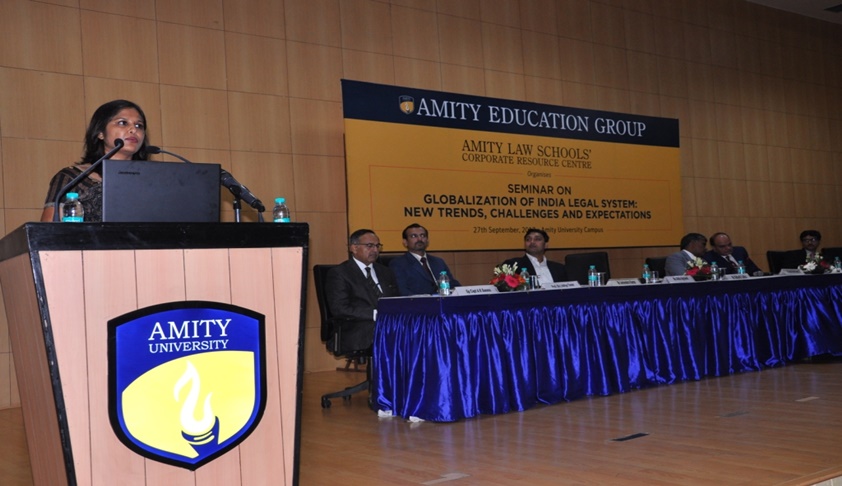Amity University Organised Seminar on Globalization of Indian Legal System: New Trends, Challenges and Expectations
manav malhotra
29 Sept 2017 8:30 PM IST

To familiarize budding legal professionals with the impact of globalization on Indian legal scenario and the emerging opportunities, Corporate Resource Centre (CRC)- Amity Law Schools organized a seminar on ‘Globalization of Indian Legal System: New Trends, Challenges and Expectations’ at Amity University Uttar Pradesh, Noida.
The seminar witnessed the presence of legal experts including Mr. Justice Suresh Kumar Kait, Judge, High Court of Telangana and Andhra Pradesh; Mr. Siddharth Luthra, Sr. Advocate, Managing Partner, Luthra and Luthra Law Firm; Ms. Akila Agrawal, Partner, Shardul Amarchand Mangaldas Law Firm; Dr. James Nedumpara, Head and Professor, Centre for International Trade and Investment Law (CTIL), IIFT; Mr. Jeetendera Kumar, Senior Manager, HCL; Ms. Abha Thapliyal Gandhi, Publishing Director, South Asia Press and Mr. Ashok Bhan, Sr. Advocate, Supreme Court of India.
Welcoming the guests, Gp. Capt. A.K. Saxena, Dy. Director & Head, CRC said that globalization has brought a revolution in International trade and economics, which has made a strong impact on the legal profession as well. He further added that it has opened new doors and established far-fetched work areas with abundant returns for legal professionals. Gp Capt Saxena averred that there are many emerging trends in legal area such as intellectual property protection, environment protection, competition law, corporate taxation, infrastructure contract, corporate governance and investment law and through interaction with legal experts, students would be more aware and enlightened for opting the right career path.
Addressing the gathering, Mr. Justice Suresh Kumar Kait said that in the age of internet and frequent international travel; judges, lawyers, academicians and even, law students across the globe have opportunities to collaborate and learn from each other’s experiences. He mentioned that with globalization in legal profession, access to foreign legal material had become much easier for information and communication, which is required for various legal cases. Justice Kait shared that with the growth of multi nationals in India, there is an urgent need to have competent lawyers who could be trained in right culture of legal education imbibed with highly technical knowledge. He opined that legal educators should also prepare the budding legal professionals to meet the new challenges of working in a globalised knowledge.
Speaking on the occasion, Mr. Siddartha Luthra said that initially, there was three year law programme in India and Indian law practices focused only domestically but with globalization, legal practices have become transnational and domestic hindrance has been changed. He stressed that Arbitration Dispute Resolution is the area in which law has witnessed a vast growth resulting in nature of legal practice to become global. He lamented that despite numerous amendments, India still has not been able to be an arbitrary hub due to interference of courts. Mr. Luthra averred that at present time, Asia is witnessing a huge movement as it is the centre for development of industry and services and opined that Indian lawyers must work toward making India a complete globalised nation by integrating with world economy. Sharing his views on globalization of law firms, he also mentioned that it is necessary for Indian law firms to change the way they function. He emphasized that in-house expertise of other professionals should be included for advice to be rendered to clients for cases. Mr. Luthra further added that without a change, Indian law firms will not be able to match the expertise of global law firms.
Ms.Akila Agrawal appraised that after globalization, law firms in India have evolved and now the firms are process driven and professionally managed commercial organizations. She advised the budding legal professionals to grab the opportunities to explore as many legal areas as possible while pursuing law programme as while practicing law, legal firms may give rotation but will not provide much freedom to young associates to dabble within legal areas. She further added that in today’s time, it is expected from a legal professional to have working knowledge about every legal aspect of client’s business. Ms. Agrawal stressed that for transactional law, firms today has country specific legal experts as it is understood that legal consultation cannot work in lines of ‘one shoe fits all’ and advised the budding professionals, seeking expertise in transactional law, to be attuned with the country specific grievances, their local issues and their legal functioning to offer the accurate legal advice.
Next Story


